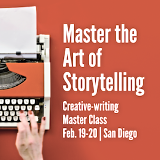3 ways to identify the narrative line
Call it an aha! moment:

Aha! moments — aka moments of truth or desk-pounding moments — like this one, from an Eastman Chemical Company annual report, form the core of every corporate story.
Here are three ways to find the aha! moment that’s the gateway to compelling stories:
1. Look to the beginning.
“That moment is the origin of every corporate program,” Murray says. “The closer you as a reporter get to the very moment the idea was hatched by a human being, the better your story is going to be.”
The moment of invention often makes for a great story. Nike, for instance, began, according to Nikebiz.com …
Looking for a brand story that sells your product or service better than facts and figures? Ask your subject matter expert when the company began, the sole was invented, the theory discovered. The moment of inception illustrates your organization’s creativity, innovation and vision.
2. Ask When questions.
Good stories cover one moment in time. So if you’re looking for a story that connects, ask when questions.
When questions take content experts back to a specific time, a specific place — and, often, a specific story. So try asking “when” questions. Focus on:
- Moments of pain
- Moments of change
- Moments of crisis
- Moments of decision
A writer once asked Kansas City architect Cary Goodman when he knew he would join his profession. He told her about the time he built a fabulous tree house at the age of 9. His construction was so great that the local paper sent a photographer to shoot it. The photo made the front page.
3. Pass the 30-second test.
How do you know whether yours is a moment of truth or just something that happened?
Pass the 30-second test: Make sure the original event didn’t take more than 30 seconds.
In an Esquire profile of Robert Redford, for instance, the writer tells about being frustrated by the actor’s incredible need for privacy. In the interviews, he was guarded and wouldn’t share any personal information.
To sum up this attribute, the writer ends with an anecdote about two fans who see the movie star at a New York City intersection:
‘Are you Robert Redford?’ she asked, breathlessly.
’Only when I’m alone,’ Robert Redford answered.
Light changes; woman sprints over to Redford; asks if it’s really him; he replies.
Thirty seconds or less.
How can your aha! moments reveal your organization’s innovations and expertise?
What’s your brand story?
Would you like more tips for finding stories that engage readers’ hearts and minds?
Until Jan. 31 only, get nearly $300 worth of learning tools free with a Silver or Gold ticket.
|
